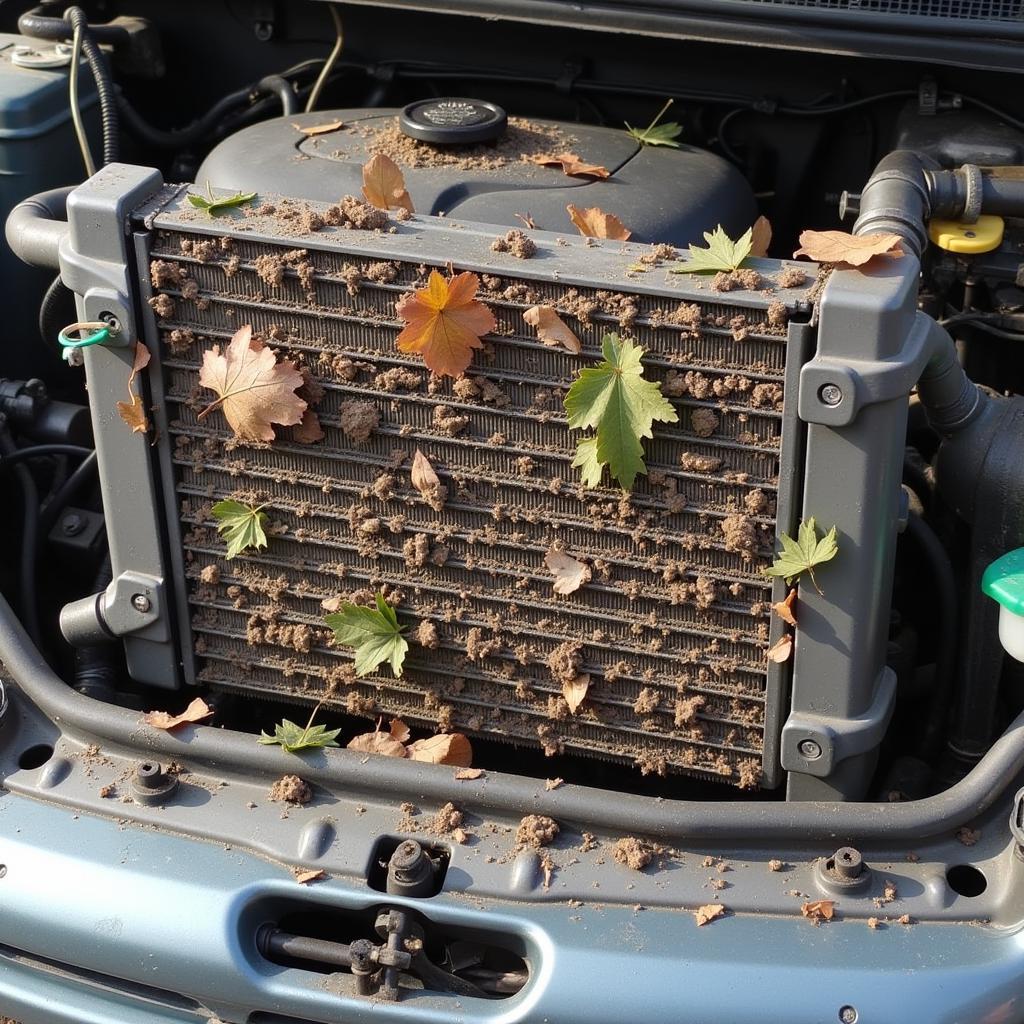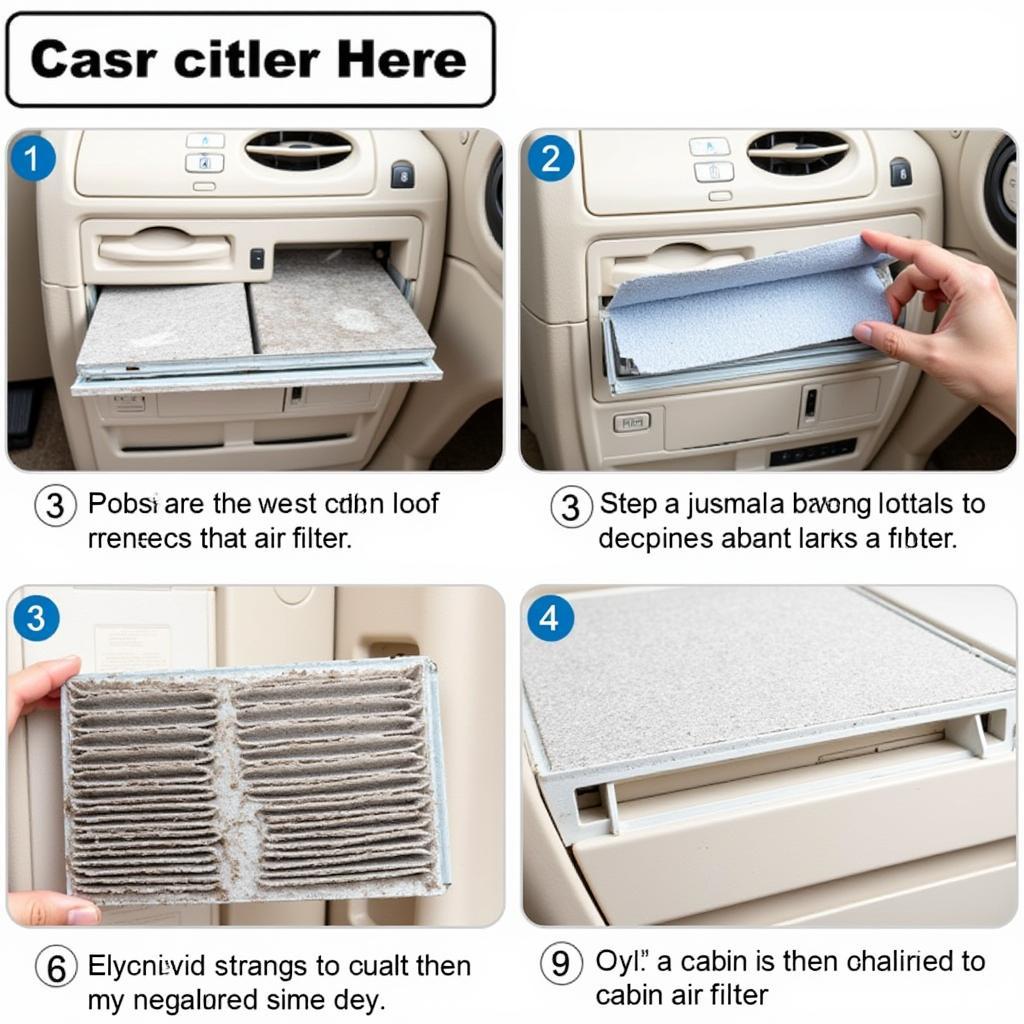A malfunctioning car cooling coil can quickly transform a comfortable drive into a sweaty ordeal. Understanding the causes, symptoms, and solutions to a Car Cooling Coil Problem is crucial for both car owners and mechanics. This guide will delve into everything you need to know about troubleshooting and repairing car cooling coil issues.
What Causes Car Cooling Coil Problems?
Several factors can contribute to car cooling coil problems. One common culprit is a refrigerant leak. When the refrigerant level drops, the cooling system’s efficiency is severely compromised. Another frequent issue is a clogged or dirty cabin air filter. This restricts airflow over the cooling coil, reducing its ability to cool the air. Additionally, a faulty blower motor can hinder the circulation of air, leading to inefficient cooling. Accumulated debris, such as leaves and insects, can also obstruct the cooling coil and impair its performance. Similar to car wont start when hot problem, these problems can sometimes manifest intermittently, making diagnosis challenging.
 Clogged Car Cooling Coil with Debris and Dirt
Clogged Car Cooling Coil with Debris and Dirt
Recognizing the Symptoms of a Failing Cooling Coil
Identifying a car cooling coil problem early on is crucial to prevent further damage and costly repairs. Some common indicators include weak airflow from the vents, even when the AC is on full blast. Warm air blowing from the vents instead of cool air is another telltale sign. A musty or unpleasant odor emanating from the vents can indicate mold or mildew growth on the cooling coil due to moisture buildup. Finally, a noticeable decrease in fuel efficiency can also point towards a cooling system issue.
Diagnosing the Issue: A Step-by-Step Guide
-
Check the Refrigerant Level: Use a pressure gauge to check the refrigerant level. Low pressure indicates a potential leak.
-
Inspect the Cabin Air Filter: Remove and inspect the cabin air filter for dirt and debris. A dirty filter can restrict airflow.
-
Examine the Blower Motor: Ensure the blower motor is functioning correctly and providing adequate airflow.
-
Visually Inspect the Cooling Coil: Look for signs of leaks, damage, or blockage in the cooling coil.
-
Check for Leaks: Use a leak detector dye to pinpoint any refrigerant leaks in the system. This is similar to how you would diagnose some common problems with 2005 lincoln town car.
How to Fix a Car Cooling Coil Problem
Depending on the specific issue, several repair options are available. For minor clogs, cleaning the cooling coil with a specialized coil cleaner can restore its efficiency. If a refrigerant leak is detected, it needs to be repaired, and the system recharged with refrigerant. A damaged or severely clogged cooling coil may require replacement. Always consult a qualified mechanic for complex repairs.
“Regular maintenance is key to preventing car cooling coil problems,” says John Smith, Senior Automotive Technician at Smith Automotive. “Simple tasks like replacing the cabin air filter regularly and checking the refrigerant level can save you from costly repairs down the road.”
Preventing Future Car Cooling Coil Issues
Regular maintenance is the best way to prevent future cooling coil problems. Replacing the cabin air filter every 12,000-15,000 miles is crucial. Regularly inspecting the cooling system for leaks and ensuring adequate refrigerant levels can also prevent major issues. Keeping the AC system clean and free of debris is another essential preventative measure. As with issues like 2004 cadillac deville used car problems, proactive maintenance can often save you time and money.
 Replacing Car Cabin Air Filter
Replacing Car Cabin Air Filter
Why is my car AC blowing hot air?
Hot air blowing from your car’s AC vents often indicates a problem with the cooling coil, such as a refrigerant leak or blockage.
What does a bad AC evaporator smell like?
A bad AC evaporator, also known as the cooling coil, can emit a musty or mildew-like odor due to moisture buildup and mold growth.
How much does it cost to replace a car AC cooling coil?
The cost to replace a car AC cooling coil can vary depending on the make and model of your car, but it typically ranges from $500 to $1,200. Some cars, like the 2005 lincoln town car motor problems, might have more complex systems, impacting the repair cost.
Can I clean my car AC cooling coil myself?
While you can attempt to clean the cooling coil yourself using specialized cleaning products, it’s often best to consult a professional mechanic for a thorough cleaning and inspection.
Conclusion
A properly functioning car cooling coil is essential for a comfortable driving experience. By understanding the causes, symptoms, and solutions to car cooling coil problems, you can keep your car’s AC system running smoothly. Regular maintenance and prompt repairs are key to preventing costly breakdowns and ensuring a cool and comfortable ride. If you’re experiencing problems, don’t hesitate to contact AutoTipPro at +1 (641) 206-8880. Our office is located at 500 N St Mary’s St, San Antonio, TX 78205, United States. We’re here to help you get back on the road in comfort. Issues like these can sometimes be related to other mechanical problems, similar to how are mazda 3 cars known for there engine problems are discussed.






Leave a Reply